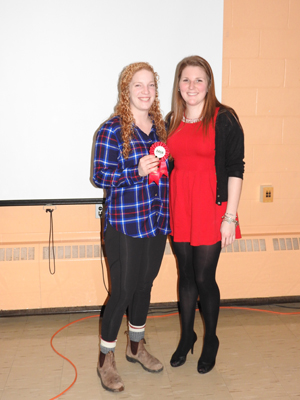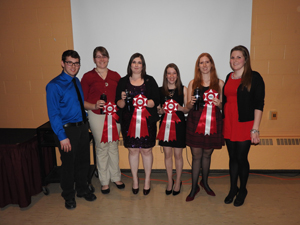News
» Go to news mainMaritime Intercollegiate Judging Competition 2016: Shining the Spotlight on Student Talent
Ever since its campus comeback nearly five years ago, the Faculty of Agriculture’s judging team has been making a regional and national impact- and an impressive one at that.
To top things off, the team’s Maritime Intercollegiate Judging Competition (MIJC), a student- driven initiative, is in its third year. Developed and organized by students, the MIJC brings the spotlight of judging to the Faculty of Agriculture and highlights our student talent.

Andrew Greene, Co-Captain and Kayla Graham. Kayla is a senior judging team member. Kayla coordinated competition stats and helped to rganize the event along with co-captain Kamryn Findlay.
This year, Andrew Greene and Kamryn Findlay, senior judging team members and co-captains of the team, have taken the lead for organizing MIJC. Greene, in his third year of the Bachelor of Science (Agriculture) program and Findlay, in her fourth year of the BSc (Agr.) program, form a strong duo based on experience and passion for agriculture.
“Judging was an integral part of my 4H career, which I started at a young age,” shared Greene. “I love competition, and the competitive nature of judging provided the perfect outlet for that interest to grow.”
“We are very proud of our judging team. Our members are actively involved on campus and are academically focused. They are able to apply firsthand the training and knowledge they obtain from the classroom,” said Findlay.
The 3rd annual MIJC was held on campus on Saturday, January 9 with teams from the Maritimes and Quebec competing.

Two teams participated from Universite Laval with strong standings throughout the day. Teams such as this made MIJC a truly eastern Canadian competition. The Dalhousie Judging Team will face off against Universite Laval again this weekend at another judging competition.
Seven teams of four students each participated, along with individuals. Classes included livestock (dairy, beef, sheep, ducks, guinea pigs and swine) and non-livestock (forages, grains, eggs, crafts and food) divisions. Competitors were scored based on their placements of livestock or non-livestock items, as well as being able to explain their placement choice to the judge. For livestock classes, being able to evaluate conformation and health are important components. In practice, understanding the best traits and structural characteristics for a particular breed of animal are important considerations before investing in livestock. For non- livestock classes, such as grains and forages, overall quality and composition are evaluated.
MIJC is an important part of the Faculty of Agriculture. Through national judging competitions, students travel to different agricultural universities in eastern Canada. The Faculty of Agriculture judging team has competitions lined up in Quebec and Ontario. MIJC allows top agricultural students to visit the Dalhousie Agricultural Campus, shining the spotlight on our talented judging team and beautiful campus.
The judging team has been hard at work in preparation for competitions throughout the year. Members have organized and participated in clinics including dairy, sheep, vegetables, woodworking, poultry and breed identification. The team has also been actively fundraising for their out- of- province competitions.
“Countless hours are required to run a competition of this nature. It requires total commitment and dedication, along with innovation and resilience,” explained Greene. “Team work is essential and having a great planning committee and eager team at the Agricultural Campus makes our vision a reality.”
The MIJC provides an opportunity for students to practice their judging skills, especially with mystery classes. Students have to use their judging knowledge to look for the important qualities and traits even if they don’t know what the class will be at the competition. To highlight its importance as a local crop, blueberries were featured in the non- livestock mystery class at MIJC.
This year’s competition brings newly created divisions for both alumni and 4Hers.
“The Alumni and 4H Divisions will continue to strengthen our relationships with 4H and our alumni. The 4H Division will help teach senior members new judging skills and improve their public speaking. The Alumni Division will keep our past judging team members involved on campus and help our team by passing on valuable knowledge,” explained Findlay. “We also have 4H leaders and current and past students as class suppliers and judges for the competition. It’s wonderful to have that connection with 4H and alumni families.”
Keltie Jones, Assistant Dean, Students and Academic Administration for the Faculty of Agriculture, agrees.
“Our annual Judging Competition is a wonderful opportunity for our students to learn more about organizing large events while demonstrating their expertise. With the addition of a 4H level, they are also getting the chance to engage with and mentor our local youth who are interested in agriculture, who might also be our future students,” said Jones.
 When asked how MIJC fits into the Aggie lifestyle, Findlay and Greene both agreed it plays a strong role.
When asked how MIJC fits into the Aggie lifestyle, Findlay and Greene both agreed it plays a strong role.
“In my opinion, the judging team is one of the few clubs on campus that use the practical skills and knowledge that they learn in the classroom in the field,” said Findlay. “I think MIJC is a great way for students to demonstrate the skills they have worked so hard to learn.”
For Alana Bent, a third year BSc (Agr.) student and top overall individual competitor at the 2016 MIJC, competing is an annual tradition.
“MIJC was really fun last year and we learned so much. Our student team members had experience through 4H so it’s nice to find a way to continue to use those skills. It’s also great to be able to apply what we learn in the classroom to judging classes like forages.”
An awards banquet was held Saturday night on campus, allowing the teams to network, learn their results and celebrate their accomplishments. Special acknowledgement was also given to the many volunteers, sponsors and judges involved in making MIJC a success.
 This year, the first place overall team was Dalhousie 1, comprised of Mikaela Marr, Emily Walsh, Janessa Henry and Hannah Jamieson. This strong team is continuing the tradition of excellence in judging at the Faculty of Agriculture.
This year, the first place overall team was Dalhousie 1, comprised of Mikaela Marr, Emily Walsh, Janessa Henry and Hannah Jamieson. This strong team is continuing the tradition of excellence in judging at the Faculty of Agriculture.
Although the campus judging team succeeded in the classes, Findlay knows it’s about more than just competition.
“I know that through judging, our students will benefit positively in their future careers.”
With the judging team making hands-on connections between the classroom and field, we know they will too.
Recent News
- Web Content Specialist ‑ Matt Goodman
- Two Programs, One big change
- Agricultural Campus Bookstore Summer Closure
- Undergraduate Advising Survey Invitation
- Communications Office Assistant
- MacEachen Institute researchers to study impact of agricultural incentives on climate, health
- Lifting Nova Scotia Workshop
- Submissions to TV screens
